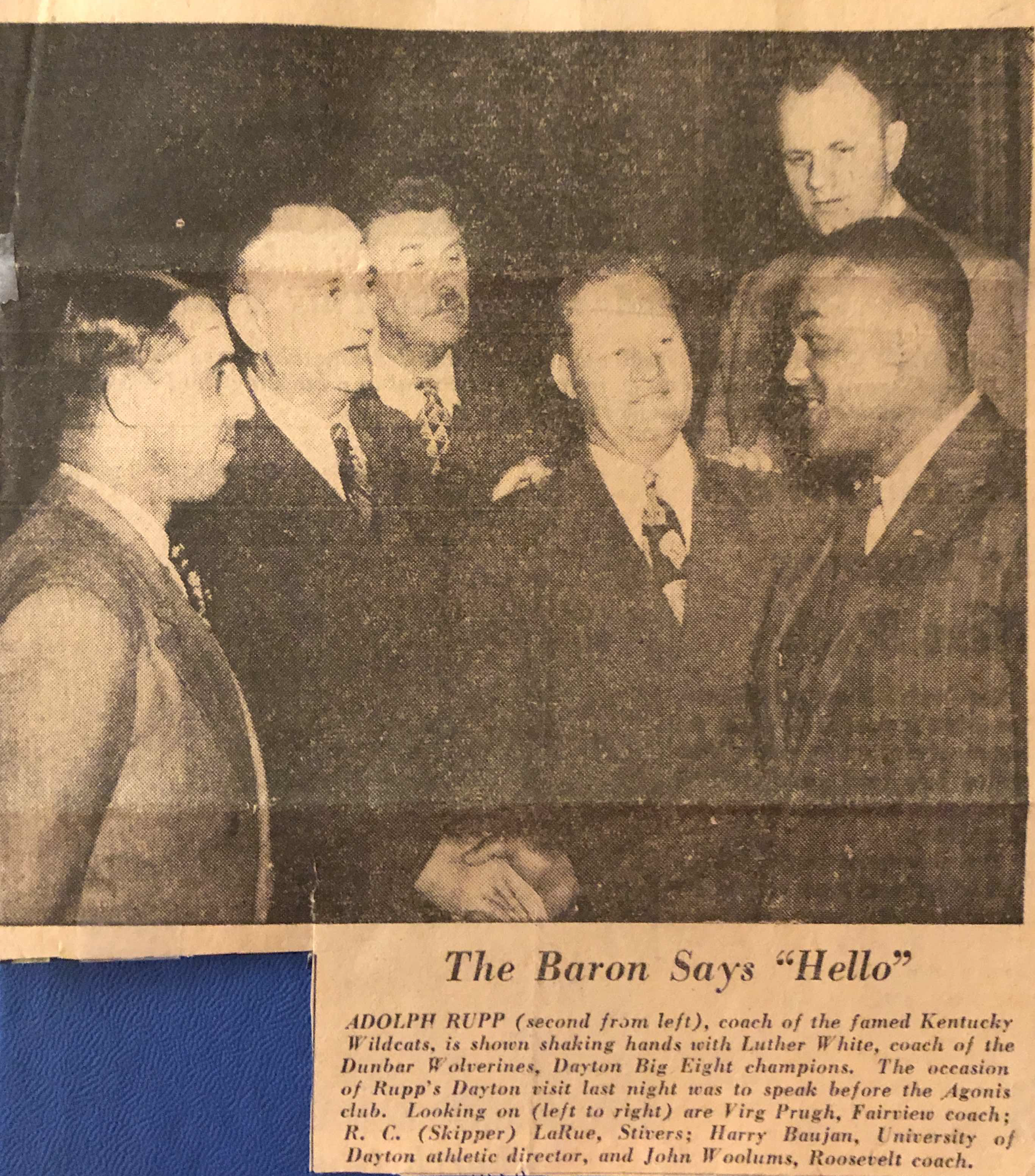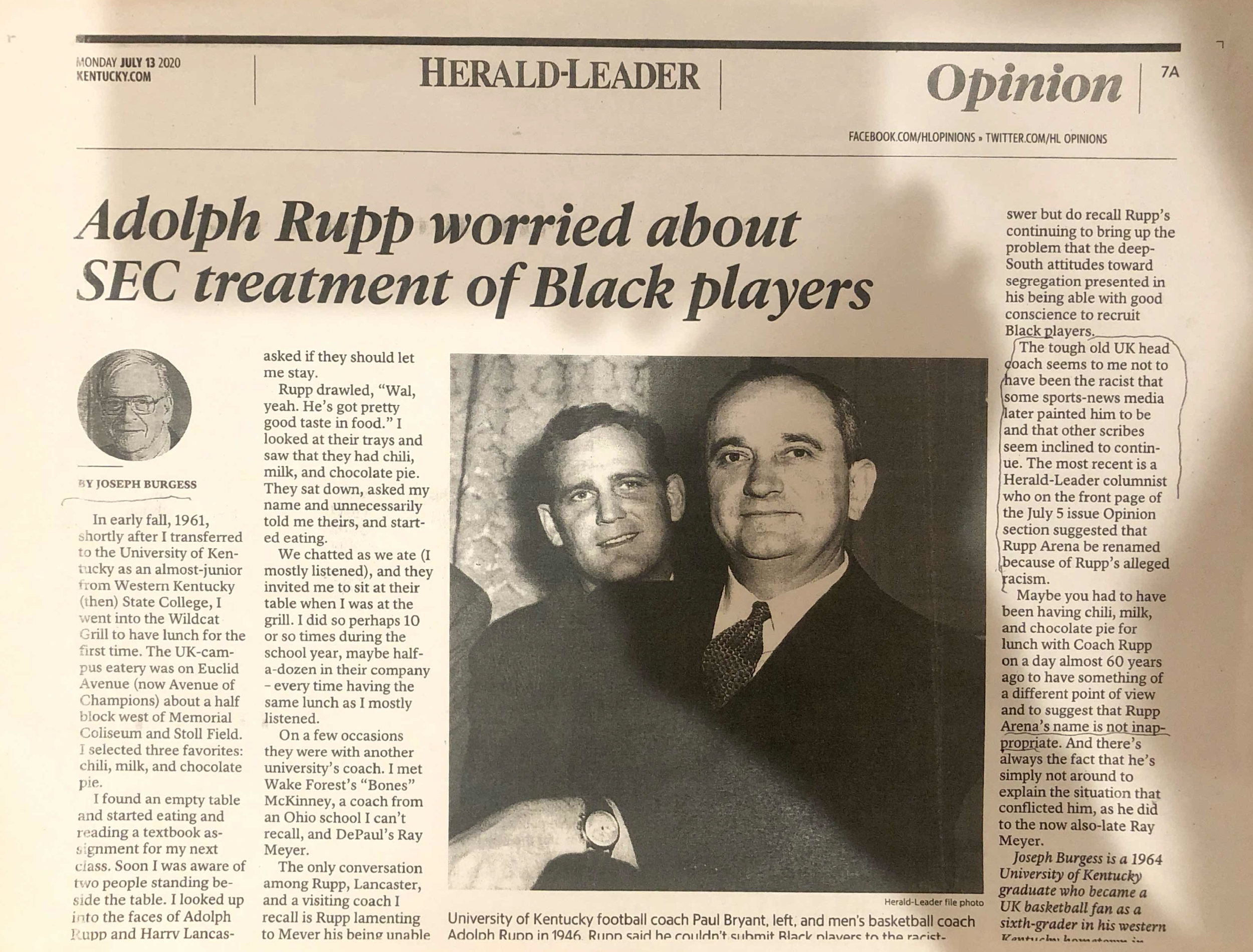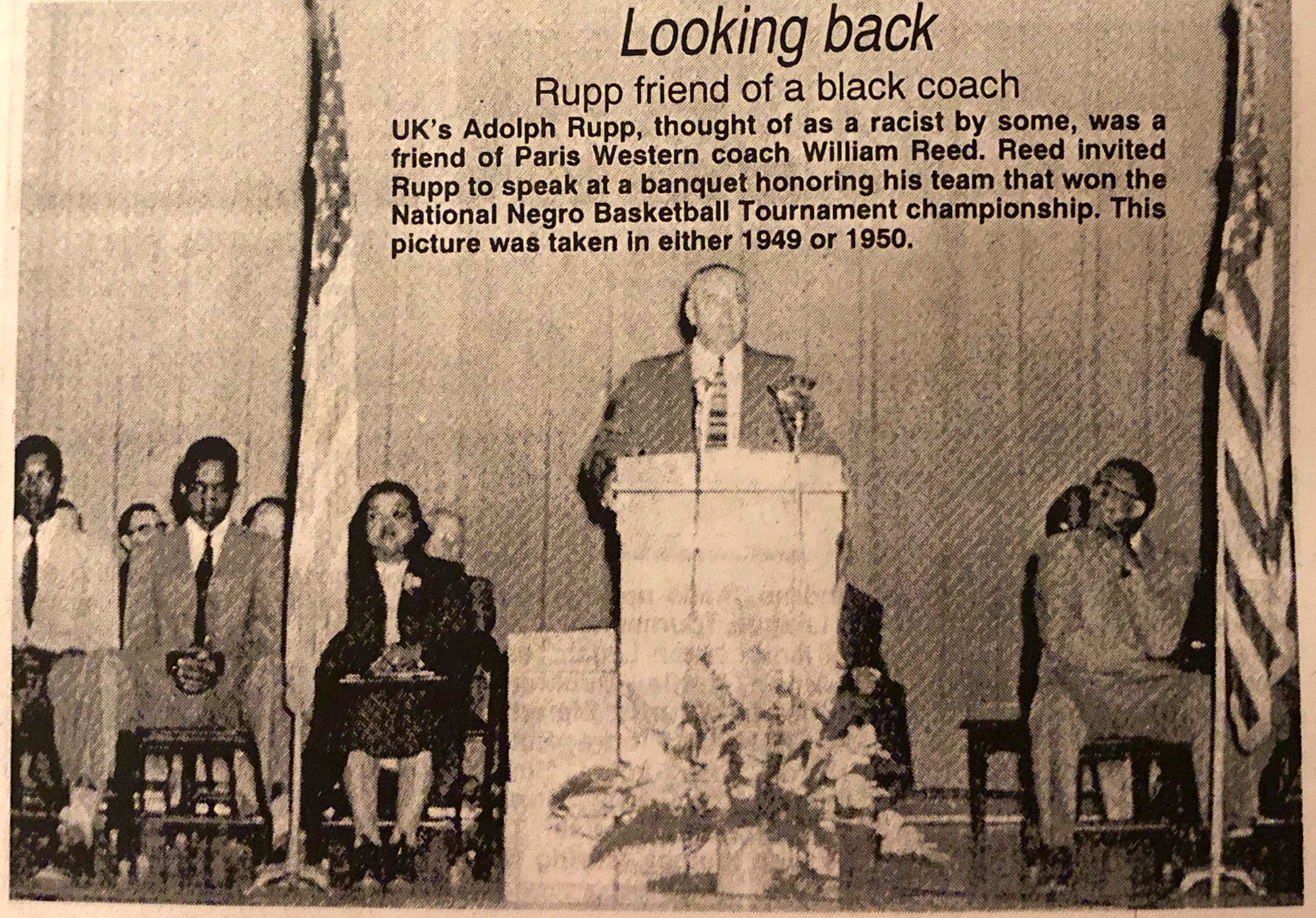In Their Own Words
From the players, coaches and sportswriters
“I believe that had he had the opportunity and the support of the school at that time, he (Rupp) would have had black players.”
“I don’t think it was Coach Rupp’s decision not to have black players. I think that, if given the opportunity, there’s no question if he knew that the kid could help him win a ball game that he would have had him.”
-Jim Tucker, first Black player on an NBA Championship team. Coach Rupp arranged an athletic scholarship for Tucker at Duquesne University in 1954 as the SEC did not permit coaches to sign Black players.
“There wasn’t any racism in him. There wasn’t. All there was, was a guy that wanted to win, would take the best players and I think he was judged on the subject harshly because he was a winner. He was a bigger than life character.”
-Pat Riley, player 1964-1967. NBA player, coach, team executive and current President of the Miami Heat
“There are a lot of misunderstandings about Coach Rupp. The one thing I know about Coach Rupp is that he was not a racist. That is one thing I know.”
-C.M. Newton, player and coach
“I never in all the years that I knew him ever heard him say a derogatory word about any minority…ever. And, I was around him a lot.”
-Larry Conley, player 1963-1966
“I keep waiting for someone to show me where Adolph Rupp once acted on the reason of race. Once. Show me. Don’t tell me what he said or may have said to somebody third or fourth hand. Show me where he once acted on race.”
-Dave Kindred, Louisville Courier-Journal sportswriter 1965-1977
"No matter how strong they make the implications, they cannot make a racist out of Adolph Rupp."
-Joe B. Hall, former Uk basketball coach
“He (Rupp) looked around that room, pointed that finger of his and he said, I want all you son of bitchin bastard racists out of this office and don’t ever come back.”
-Neil Reed, Assistant Coach 1963-1965 describing an encounter in Coach Rupp’s office with a dozen athletic boosters who were complaining about Rupp’s recruiting of Wes Unseld.
“Rupp was a great person to me. You hear certain things, and everybody has their likes and dislikes, but I really enjoyed him (Rupp). He told good stories and jokes, and he shared a lot of his coaching tips, which meant a lot to me since I was a young coach at that time.”
-Will Robinson, first Black head coach of a sport at a predominantly white university (Illinois State University). Robinson worked at a coaching clinic with Rupp in Three Rivers, Michigan, in the late 1940s.








“I knew him (Rupp) for a long time and nothing he ever did or said made me think this guy was prejudiced.”
-Cawood Leford, UK sports announcer
“All I know is that he helped me get an opportunity to play ball at a school where I was an All-American. I can always say I’m eternally grateful to that guy (Rupp). He helped me get where I am.”
-Jim Tucker
“All these people who never met the guy said he was a racist. I knew the guy. I traveled with him, I spent time with him. I never saw any sign from him or heard anything from him that indicated to me that he was a racist or a bigot in any way.”
-Red Auerbach, Hall of Fame NBA coach
“It’s very wrong to put that burden on Adolph Rupp. Adolph Rupp was not responsible for discrimination. Our society was responsible for creating an environment which was conducive to accept that.”
-John Thompson, former basketball coach, Georgetown University
“I never heard him say one bad comment about blacks.”
-Vernon Hatton, member of the 1958 National Championship team
“I never heard or saw him say anything racist in any form at all. He treated everyone the same way.”
-Jim Andrews, a member of Rupp’s final team in 1972
“As early as 1957, UK tried to recruit blacks. And as early as 1964, and it’s a matter of record, Rupp made a serious effort to recruit Wes Unseld. Who else in the South was doing more? I’m sure that, like a lot of white men of his age, Rupp might have felt uncomfortable around blacks. Yet he also understood the way the game was changing. In 1957, 1964, and 1966, UK was eliminated by teams led by black stars. And always remember this about Rupp: He wanted to win, more than anything, and if that meant recruiting Martians, well, by God, Rupp would recruit Martians.”
-Billy Reed, Lexington Herald-Leader columnist and college basketball sportswriter for Sports Illustrated
Julius Berry, an aide to Lexington’s mayor, said Rupp helped him get a scholarship to Dayton. “We happened to be sitting in the same airport,” Berry said. “He said to me that they’d love to have me but colored boys couldn’t play in the SEC. He sounded genuine when he said it. “When I chose Dayton, (coach Tom Blackburn) there said to me that Rupp had told him that if he didn’t recruit me, he was crazy.”
– by Rick Morrissey, Chicago Tribune, “New Faces Leads Kentucky These Days,” November 20, 1997
“I love Adolph Rupp because of one thing. Adolph Rupp put me out on that court when the time came.”
-Tom Payne, first Black UK basketball player
“Coach Rupp was my inspiration, a father figure through Big Brothers of Lexington, he changed my life. Because of him, I graduated from Western Kentucky University with scholastic honors, a Bachelors and Master’s degree. I became a WKU Football Coach for two years and later became President of an International Company, eventually purchasing Brookings Chili. His impact on my life led me to become a model citizen. Coach Rupp nor the Rupp family deserve his legacy to be destroyed.”
- John Dance, former "little brother" to Coach Rupp through Big Brothers of Lexington, Owner of Brookings Chili
“In conversations professional and personal from our introduction in 1966 until his death in 1977, I never heard him say a racist word. The late University of Kentucky basketball coach needs no defense by a sportswriter who knew him only in his last years. His decades of fund-raising work for the Shriners Children’s Hospital is all the evidence anyone needs of his good-heartedness. But the race thing keeps coming up, and it bothers me because it doesn’t ring true. Not the Rupp I knew.”
-Dave Kindred
